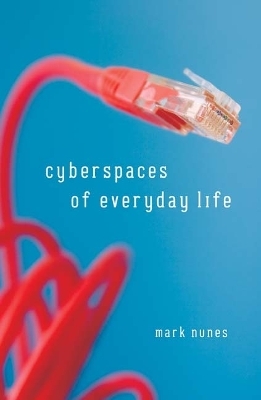
Cyberspaces Of Everyday Life
Seiten
2006
University of Minnesota Press (Verlag)
978-0-8166-4792-7 (ISBN)
University of Minnesota Press (Verlag)
978-0-8166-4792-7 (ISBN)
Shows how network technologies produce social space. This work provides a critical framework for understanding how the Internet takes part in the production of social space. It explores the ways in which the Internet restructures the university. It sheds fresh light on the question of virtual space and its role in the offline world.
Networks and computer-mediated communication now penetrate the spaces of everyday life at a fundamental level. We communicate, work, bank, date, check the weather, and fuel conspiracy theories online. In each instance, users interact with network technology as much more than a computational device.
Cyberspaces of Everyday Life provides a critical framework for understanding how the Internet takes part in the production of social space. Mark Nunes draws on the spatial analysis work of Henri Lefebvre to make sense of cyberspace as a social product. Looking at online education, he explores the ways in which the Internet restructures the university. Nunes also examines social uses of the World Wide Web and illustrates the ways online communication alters the relation between the global and the local. He also applies Deleuzian theory to emphasize computer-mediated communications’ performative elements of spatial production.
Addressing the social and cultural implications of spam and anti-spam legislation, as well as how the burst Internet stock bubble and the Patriot Act have affected the relationship between networked spaces and daily living, Cyberspaces of Everyday Life sheds new light on the question of virtual space and its role in the offline world.
Mark Nunes is associate professor and chair of the English, Technical Communication, and Media Arts Department at Southern Polytechnic State University.
Networks and computer-mediated communication now penetrate the spaces of everyday life at a fundamental level. We communicate, work, bank, date, check the weather, and fuel conspiracy theories online. In each instance, users interact with network technology as much more than a computational device.
Cyberspaces of Everyday Life provides a critical framework for understanding how the Internet takes part in the production of social space. Mark Nunes draws on the spatial analysis work of Henri Lefebvre to make sense of cyberspace as a social product. Looking at online education, he explores the ways in which the Internet restructures the university. Nunes also examines social uses of the World Wide Web and illustrates the ways online communication alters the relation between the global and the local. He also applies Deleuzian theory to emphasize computer-mediated communications’ performative elements of spatial production.
Addressing the social and cultural implications of spam and anti-spam legislation, as well as how the burst Internet stock bubble and the Patriot Act have affected the relationship between networked spaces and daily living, Cyberspaces of Everyday Life sheds new light on the question of virtual space and its role in the offline world.
Mark Nunes is associate professor and chair of the English, Technical Communication, and Media Arts Department at Southern Polytechnic State University.
Mark Nunes is associate professor and chair of the humanities department at Georgia Perimeter College, Clarkston Campus.
| Erscheint lt. Verlag | 26.8.2006 |
|---|---|
| Reihe/Serie | Electronic Mediations ; Vol.19 |
| Verlagsort | Minnesota |
| Sprache | englisch |
| Maße | 149 x 229 mm |
| Themenwelt | Mathematik / Informatik ► Informatik ► Web / Internet |
| Sozialwissenschaften ► Kommunikation / Medien ► Allgemeines / Lexika | |
| Sozialwissenschaften ► Soziologie | |
| ISBN-10 | 0-8166-4792-5 / 0816647925 |
| ISBN-13 | 978-0-8166-4792-7 / 9780816647927 |
| Zustand | Neuware |
| Haben Sie eine Frage zum Produkt? |
Mehr entdecken
aus dem Bereich
aus dem Bereich
Handbuch für die Praxis
Buch | Hardcover (2023)
O'Reilly (Verlag)
CHF 55,85


